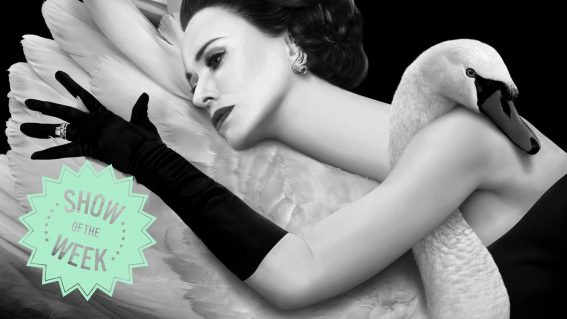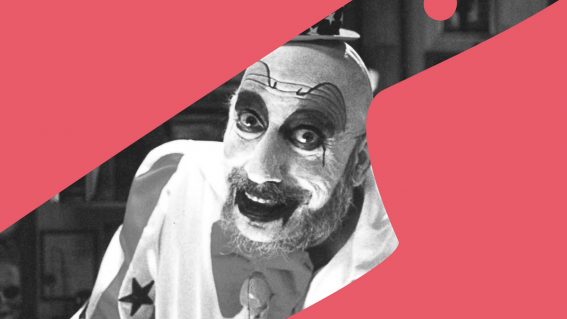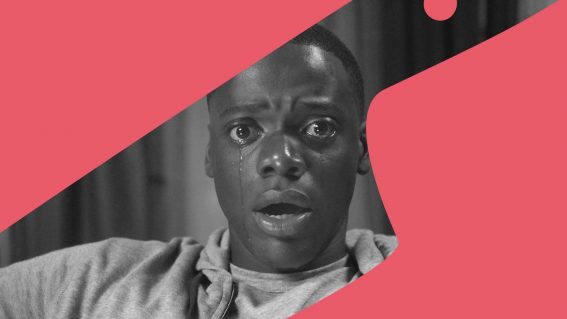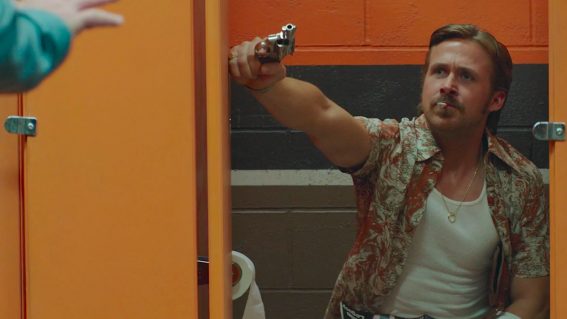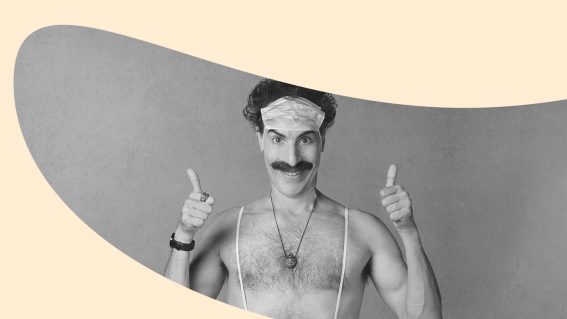Interview: ‘Weiner’ Co-director on Her Fascinatingly Flawed Doco Subject
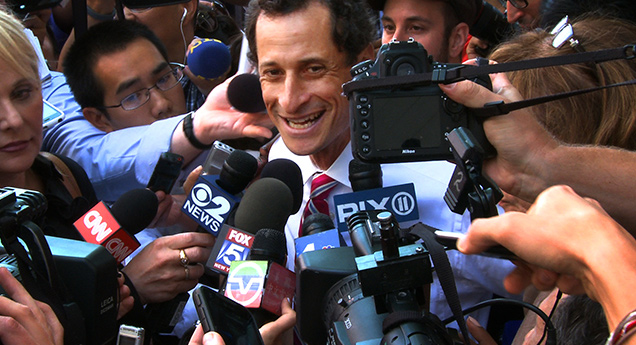
If a funny name was ever going to stop anyone getting into politics, it would have been the unfortunately-surnamed Anthony Weiner, a particularly-suited name for someone fond of sexting pics of his todger.
Having made it through one embarrassing sex scandal that led to his resignation as a Congressman, Weiner regrouped for a run at New York’s mayoralty. As the fascinating documentary Weiner recounts, things didn’t exactly go smoothly. Co-director Elyse Steinberg joined us on the phone to shed more light on her film.
FLICKS: The specifics of this particular fall from grace are quite spectacularly enthralling, yet somewhat familiar in terms of the the process that gets followed – a first forced-seeming apology, and then a series of lies as the truth gradually comes out. As well as fact, we see it in our fiction – with ‘House of Cards’, ‘Boss’, etc. How much did the reality differ from that for you?
ELYSE STEINBERG: My co-director had been very much involved in politics. I think I was probably like your average viewer in terms of my understanding of politics. I was engaged but it wasn’t something I followed with extreme intensity. But what we were excited about with this film is that we got access to a fascinating figure in this moment of an election which has a natural story arc to it. You have an unfolding story that will have a beginning, middle, and end, which is a great thing for a documentary, and we wanted to watch the story unfold. So I went in with sort of no real preconceived notions, other than I had a fascinating character who was going on this mission, and let’s see what happens.
And then, of course, six weeks into the campaign, he was at the top of the polls and people thought that he could be mayor, and then, of course, the sexting scandal broke, and we were there, and the story changed. But I think that one of our intentions going in was to highlight what you’re seeing behind the scenes that you typically don’t get to see. I think the realities behind a political scandal are much more complex than the snippets and the flurry of soundbites and headlines from which we get our information.
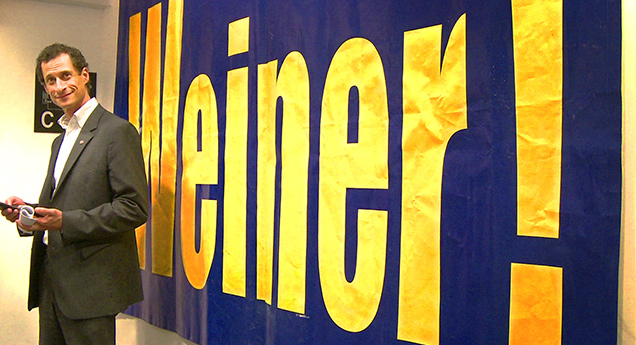
As the story quickly went from top of the polls to new scandal, how much time actually elapsed between those events? Was the scandal a leak in direct response to the poll result?
No, there’s no connection. It’s what happened in the chronology of the story. He happened to have been at the top of the polls when they had breaking news about his scandal. I think Sydney Leathers, who had been his virtual sexting mistress decided to come forward at that moment.
For the viewer, it’s amazing to see faces fall in real time, the very first human reactions to the shit that’s going down around them. It must have felt like documentary magic to be in the room as some of those things unfolded.
I definitely think that my co-director and I looked at each other and realized that we had a very special vantage point to look at the events that were unfolding. We were given this access, Anthony and Huma [Abedin, Weiner’s wife] were opening their lives to us. And we wanted to be careful, though, that within the story construction, it didn’t go into sensationalism. That there’s a temptation when you have such extraordinary access to play on the entertainment value, and what we wanted to do is, yes, craft an entertaining story, but we also wanted to highlight larger issues about our politics, and our media, and about how so much today is driven by entertainment and spectacle. And so, while we did have extraordinary access, we also wanted to craft a story that went beyond that.
How did you view the Anthony you saw on a daily basis with the really breathless coverage, full of faux moral outrage, that started coming when the scandals broke?
Well, I think that there was a striking difference between what was in the headlines of the tabloids versus the human story that we were seeing between Anthony and Huma and the staffers. There was this difference, reality was more complex and more nuanced, and they were being reduced to caricatures, both Anthony and Huma. But, on the other hand, I do think that Anthony is the first to say that the media is not to blame for the events that unfolded. I think that he played a role, the media plays a role, and we as consumers play a role in how our politics and stories are just driven towards entertainment.
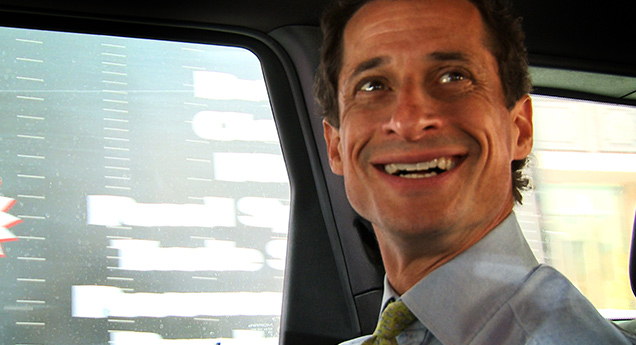
As the project came together initially, was it a case of seeing a great opportunity to make a documentary about someone that’s recovering from a fall from grace? Did you feel that you might be playing some part in a bit of a public rehabilitation for Anthony?
We did think it could be a comeback story, that it had that potential. I don’t think that we saw it as, in any way, it being about rehabilitating him. It was about getting a more fuller picture of his story. He had been reduced to such a punchline, and it was an opportunity to look at a mayor’s race, to get this firsthand look at the events as they unfold in a way that you typically don’t get to see. So we were being much more experiential in our approach.
For his camp, do you sort of know what their motivations were? Because I’m sure that from his point of view, to give the kind of access that the film opens with, and pretty much maintains throughout, you just have to wonder if there’s a bit of a strategy, that he thought this could be a really useful tool. Which – if that’s the case – well, that kind of backfired a little bit.
I think that this question about, “Why did he allow us to film,” is a question that we wondered about throughout the filming, and there’s a moment where I included that question in the film. And Anthony answers at the end of the film when he says that he wanted to be viewed as the full person that he was instead of a punchline. So our hope was to show this complexity, but let’s not forget, he also does have a very complicated relationship with the camera. He has, as he has talked about, a narcissistic personality that thrives off of attention. So there was that complication in it, as well.
An amateur armchair psychologist would say that people with compulsions often want to be caught, and certainly, some of Anthony’s accidental behaviour could be consistent with that. As he responds more confrontationally to events, at times he comes across as if he feels the relief that some of this stuff’s out in the open, and he’s being probably the more authentic version of himself that he’s been for a long time. Is that a sentiment you share at all?
I think that towards the end of a campaign that had turned brutal, a lot of people were condemning him and asking him to get out of the race, and he was just very tired. And so I think that you do get to see some of that coming out in the film, and you also see the way in which everything started to have an absurdist quality [chuckles] to it, which was true to the events as they unfolded.
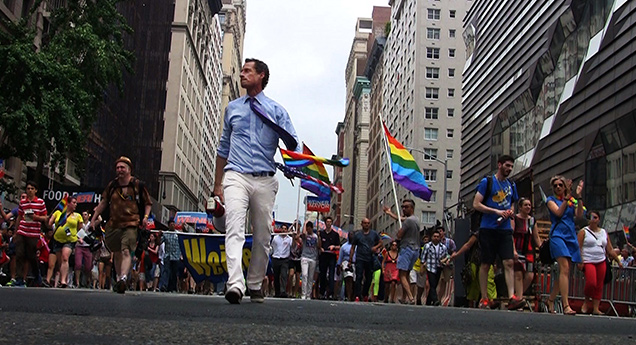
This felt a little bit like a coming out story in a way. Once you’ve gone through that period of initial denial and that very limited mea culpa, as more evidence comes out, as a more complete picture gets painted of a man with a compulsion, when he stops denying the compulsion, perhaps there’s actually something positive in that moment for him somehow.
Well, in our film, he talks about that he was liberated in a death row kind of way when I think he realized that he didn’t have a chance. He has this quality of being aware and then, of course, being blind. Acknowledging some of his issues that he struggled with, but then, also, being blind to them. And so there’s a mixture of that.
As you looked at the other candidates in the mayoral race, did you start to see them as strange creatures that may have skeletons in the closet, and start to look at politicians as a slightly different breed? Or do you think, in this instance, in that election, it’s just particular to Anthony?
No, I think that since making this film and looking at the presidential race here, I think there are parallels between Anthony and Trump. Anthony and Trump are similar. They both understand how to talk in a language that goes viral on YouTube, they know how to use social media, and I think there is something about the way in which we reward these male politicians for their entertainment value. And so, to me, that says something about where we are, and I find it to be a kind of disturbing trend.
What was it like watching Huma deal with the impact of the campaign and scandals, and watching the immense strain between her and her husband?
I think it was hard. You obviously saw the strain that they faced and that was on their marriage during the media frenzy that unfolded. She did support him, she did appear at his press conference, but then you did see that she pulled away at a certain point, because I think it was a tense time. And you see the judgement that was placed upon her for her decision to stay in the marriage, which I think our film also tried to highlight that there’s this tendency to judge and to kind of question those judgments.
There are a couple of moments in the film where you obviously needed to be instantly in place and shooting immediately. How did you work in an environment where you had to basically just be prepared to drop everything that you’re doing and run with a camera and get the footage as it was breaking?
Well, from the outset, after the first week, we had a production strategy in place, which is that my co-director was the primary shooter of the film. We made a decision that it made sense for him to be filming with Anthony, and in those sort of intimate moments, and then we had other shooters that we hired to do external shots that were not related to the sort of private home stuff. So it was a mixture of my co-director and some other shooters, and then every day we would kind of assess what we needed and what we should film. But we knew that it would end. It was about four months, so we knew it would end, yeah.
I suppose there’s some parallels that you could draw with the campaign itself, right? That it’s a narrative that changes on a daily, if not hourly basis. You’re trying to tell a story with the film, you’ve obviously got the luxury of being able to go into editing afterwards and pull a story together, but in some ways, you’re kind of in similar trenches really. The main difference being it’s not your career and reputation that’s destroyed if it all goes wrong.
Yeah, I think that Josh, when he was filming, definitely became a part of it. He was what they called the fly on the wall. Anthony makes a joke like that to Josh. So you definitely become embedded in a person’s life. You’re a part of it. And that’s why I think we had moments throughout the film just acknowledging Josh’s presence, because we were there, and we were documenting it, and this is our story that we’re telling.
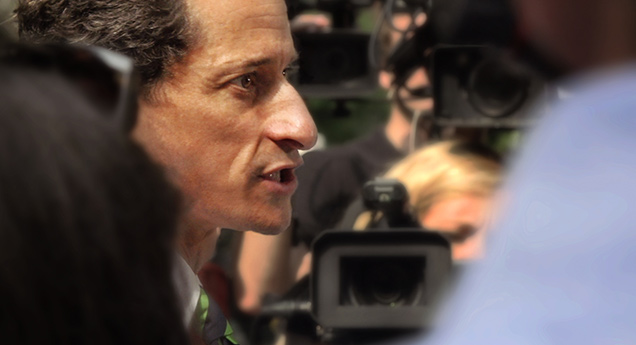
After being through this process of making the film, does it leave you feeling a certain way when you see him back in the news for the wrong reasons?
I think that Anthony has this personality that he continues to just repeatedly do destructive things, and you see that in our film, and we’ve been seeing it recently in all the events that have been unfolding. And it is disturbing, but I think it is just a part of Anthony’s story. He has this savviness and awareness, and then he has these other serious problems of being so self-destructive, and destructive to the people around him.
I think it’s a personality type that’s not uncommon, even with all the outward appearance of confidence, intelligence, and success. You could be an actor, you could be a musician, but on the inside, there’s something that’s really telling you none of that’s true, and there’s an urge to burn the whole thing down.
Yeah, he certainly has a kind of self-destructive quality. There’s no doubt about that.
One thing that’s picked up in the film at a few moments are the responses of women in the press corps to his behaviour. Did you sense, as scandals broke, a difference as to whether it was women or men asking questions, or reacting to these things in the moment? Because it seems like the disgust among women seemed pronounced in some of those sequences.
No, I think there was a range of reactions to his scandal. There were a lot of people who were disgusted and angry, then he got some people saying, “This isn’t a big deal,” so I think everybody came to it with their own preconceptions and bias towards their attitudes towards what he had done.
Last question before we wrap up. How has making the film left you feeling about American politics right now?
Our film is more about than just one person, or one campaign, it provides a look at how our politics was just driven by entertainment and spectacle. And we don’t have to look very far to see that being played out with the presidential nominee, Donald Trump. He is able to get attention and win votes by putting on a show, and he speaks in a language that allows him to go viral on YouTube and Twitter. So I think it shows the way in which our politics has become a lot about entertainment.
Watch ‘Weiner’ On Demand or get it on DVD here



